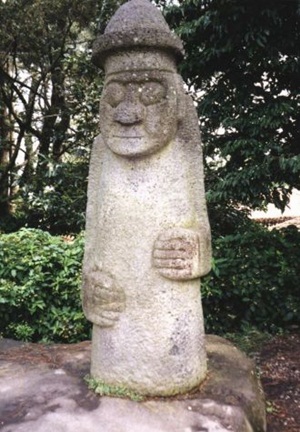The symbol of Jeju, Dol-hareubang

Etymology
The name Dol-hareubang derives from the Korean word for "stone" (dol ) plus the Jeju dialect word hareubang meaning "grandfather" or "senior" (harabeoji in Standard Korean) and was coined in the mid-20th century.
History
There are three main theories as to the origin of Dol-hareubangs; either that they were introduced by visitors from the sea, that they are a counterpart to the jangseungs (totem poles) of mainland Korea, or that they spread with shamanic mushroom culture. Jangseungs are also called beoksu in southern Korea and this similarity with the name beoksumeori lends credence to the second and third theories.
Mt. Halla has been named in Chinese literature as one of the "Sam Shin San”, or one of the Three Spirit Mountains. Each of these mountains is considered a gateway to the spirit world, and has the Amanita muscaria growing in abundance. This mushroom is well known by the Siberians and is a possible origin for the Stone Grandfather.
This theory lends that powerful shamans descending from the north established a magic mushroom cult on the island in which stone grandfathers were set at the sides of thresholds to prevent the entry of unwanted spirits.
The mushroom and its related imagery have had great importance in Korea, visible in ancient crowns and funeral urns. The Dol-Harubang is a form of political propaganda, a representation of the sacred powers of the mushroom and its associated deity and a testament to the power of the Shamans. Dol-hareubangs produced from 1763-1765 once stood outside the eastern, western, and southern gates of the Jeju City fortress as guardian deities.
Dol-hareubangs today
Dol-hareubangs have become the symbol of Jeju Island and replicas of various sizes are sold as tourist souvenirs. The statues are sometimes sold as sources of fertility and small replicas are sometimes given to women with fertility problems. The origin of this may have more to do with Jeju Island’s present day status as a 'honeymoon island' than tradition.

